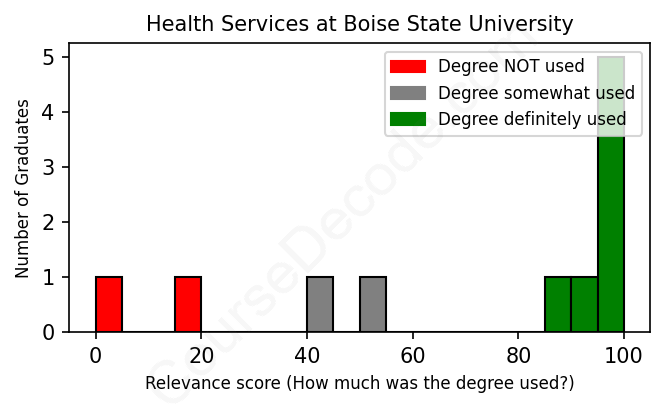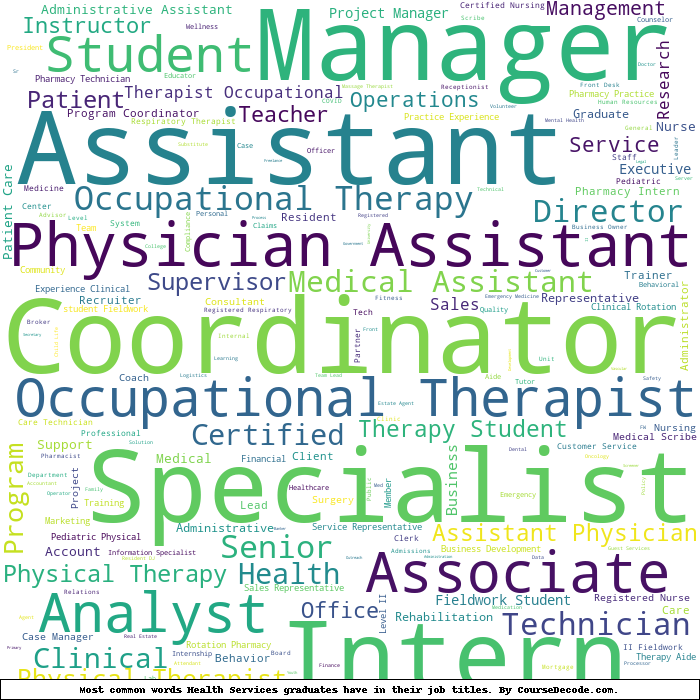
First, some facts. Of the Health Services graduates from Boise State University we've analyzed , here's how many have used (or NOT used) their degree in their career:

These are estimates based on AI analysis of 11 LinkedIn profiles (see below).
The verdict? Slightly above average. Overall, with an average relevance score of 71%, Health Services graduates from Boise State University have a slightly higher likelihood (+4%) of finding work in this field compared to the average graduate across all fields:
And for comparison, here's the chart for all profiles we've looked at across all degrees.
Also, after graduating, only 27% of these graduates have pursued further education other than another Bachelor's degree (such as a Masters degree or other), compared to the average across all profiles of 35%. This suggests a Bachelors degree is enough for most Health Services graduates, and it's normal to look for work straight after graduation.
See the details:
|
Relevance score: 97% We think this person has gone into a career highly relevant to their degree. We think this person has gone into a career highly relevant to their degree.
DEGREE INFOGraduated in 2015 from Boise State University with a Bachelor's degree in Health Services. Also pursued further education since (see below). JOB HISTORY SINCE GRADUATIONResearch Assistant Boise State University Jan 2015 - May 2015 Registered Dental Hygienist  Dental Practice Aug 2018 - Present FURTHER DEGREES DONE SINCE GRADUATINGAssociate of Science - ASCarrington College-Boise 2017 - 2018 ABOUTRegistered Dental Hygienist Local Anesthesia LicensedCPR Certified |
The top 10 most common jobs done by the graduates we've analyzed (ranked most common to least) are:
From the data gathered, it seems that graduates with a degree in Health Services from Boise State University often find jobs in healthcare-related fields, especially within hospitals and health systems. Roles like Clinical Application Specialist, Clinical Operations Manager, and Registered Dental Hygienist show that many alumni are working directly in health services or patient care, utilizing the core skills and knowledge they gained during their studies. These positions indicate a strong relevance to their degrees, allowing them to apply their training in significant ways that impact patient care and healthcare operations.
However, there are also a notable number of graduates who have ventured into jobs that aren't exactly aligned with the Health Services field. For example, roles like Web Developer or Manager at a coffee shop highlight that some graduates have diverted to positions that, while they may touch on some skills relevant to health services (like management or customer service), don't require the in-depth health knowledge expected from their degree. This split shows a diverse career path among these graduates, with many finding meaningful roles in health services but others choosing different directions entirely, often due to the versatility of their degree.
Here is a visual representation of the most common words in job titles for Health Services graduates (this is across all Health Services graduates we've analyzed, not just those who went to Boise State University):

The graduates from the Health Services program at Boise State University show a diverse set of career trajectories, but many of them appear to find their way into roles that connect back to healthcare or related fields. Right after graduation, a lot of them seem to take entry-level positions that help them get their foot in the door, like research assistants, health educators, or even patient advocacy roles. For example, recent grads have worked as Community Health Educators and Patient Financial Advocates, suggesting that many are starting off in positions that still align with health services and community-based care. Others, however, have ventured into non-healthcare domains, like web development or management at coffee shops, which may not directly relate to their degree but show versatility in career paths.
Fast forward five or ten years, and you can see some graduates have stayed within the health services arena and climbed the ranks into managerial and directorial roles, like those at St. Luke's Health System. Others took a bit of a detour, finding success in areas like marketing or operations for non-healthcare companies, which indicates some level of adaptability in their skill sets. While there are definitely some alumni still involved in fields directly related to their degree, the mix of careers suggests a trend where not every graduate ends up in a strictly health services job. Overall, many do seem to find fulfilling work within or adjacent to the health sector, which is promising for those considering this path. However, some also branch out into areas that may not utilize their specialized knowledge, highlighting how personal interest and career opportunities can shape their professional journeys.
Honestly, a Bachelor’s degree in Health Services at Boise State University is about average in terms of difficulty, but it really depends on your interests and strengths. If you’re into health topics and enjoy working with people, you might find the coursework more engaging and manageable. You'll take a mix of classes about healthcare systems, ethics, policy, and maybe some stats, which can be a bit tricky if you're not into numbers. Overall, it’s not super beat-your-head-against-the-wall hard, but you'll definitely need to put in some solid effort and stay organized to keep up with the readings and assignments. So, if you’re motivated, it should be a good fit for you!
Most commonly, in the LinkedIn profiles we've looked at, it takes people 4 years to finish a Bachelor degree in Health Services.
Looking at the jobs these Boise State grads have had, it seems like there's a bit of a mixed bag when it comes to how much they've been making. The ones in health services and management roles, like the Clinical Application Specialist and Regional Operator at Dutch Bros, probably pulled in some decent salaries, especially as they moved up the ranks. On the other hand, positions like a Research Assistant or Front End UX Developer, while definitely important, might not be raking in the big bucks yet, especially early in their careers. It seems like some of them are doing pretty well, but others might be in the "just getting started" stage in terms of salary. So, overall, it looks like a solid mix, with some likely making decent money and others still climbing up the income ladder!
Here is a visual representation of the most common words seen in the "about" section of LinkedIn profiles who have a Bachelor degree in Health Services (this is across all Health Services graduates we've analyzed, not just those who went to Boise State University). This may or may not be useful:

Here are all colleges offering a Bachelor degree in Health Services (ordered by the average relevance score of their Health Services graduates, best to worst) where we have analyzed at least 10 of their graduates:
| College | Score | Count |
|---|---|---|
 The Ohio State University The Ohio State University
|
88 | 14 |
 Quinnipiac University Quinnipiac University
|
88 | 10 |
 Grand Valley State University Grand Valley State University
|
87 | 16 |
 University of Tampa University of Tampa
|
87 | 10 |
 Stony Brook University Stony Brook University
|
80 | 15 |
 Boston University Boston University
|
79 | 12 |
 University of Connecticut University of Connecticut
|
78 | 26 |
 Florida Agricultural and Mechanical University Florida Agricultural and Mechanical University
|
76 | 12 |
 Texas A&M University Texas A&M University
|
72 | 16 |
 University of South Florida University of South Florida
|
72 | 26 |
 Boise State University Boise State University
|
71 | 11 |
 University of Central Florida University of Central Florida
|
68 | 47 |
 Florida Gulf Coast University Florida Gulf Coast University
|
68 | 10 |
 James Madison University James Madison University
|
66 | 26 |
 University of Missouri-Columbia University of Missouri-Columbia
|
66 | 17 |
 California State University, Fullerton California State University, Fullerton
|
66 | 13 |
 California State University - East Bay California State University - East Bay
|
66 | 10 |
 Arizona State University Arizona State University
|
62 | 10 |
 Cleveland State University Cleveland State University
|
60 | 10 |
 Stockton University Stockton University
|
58 | 12 |